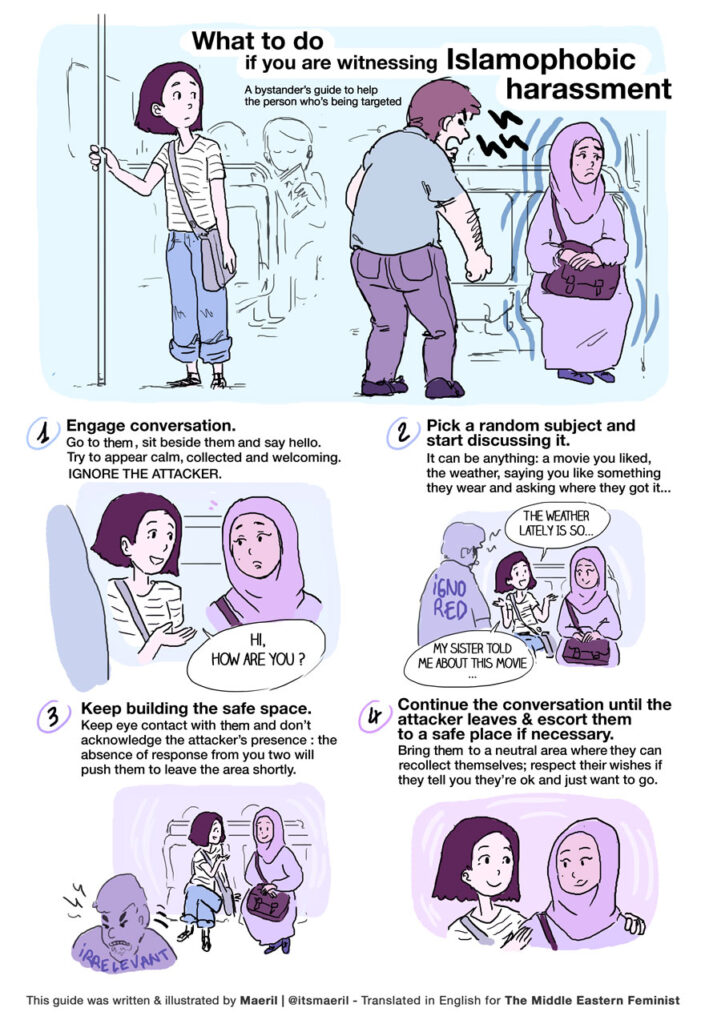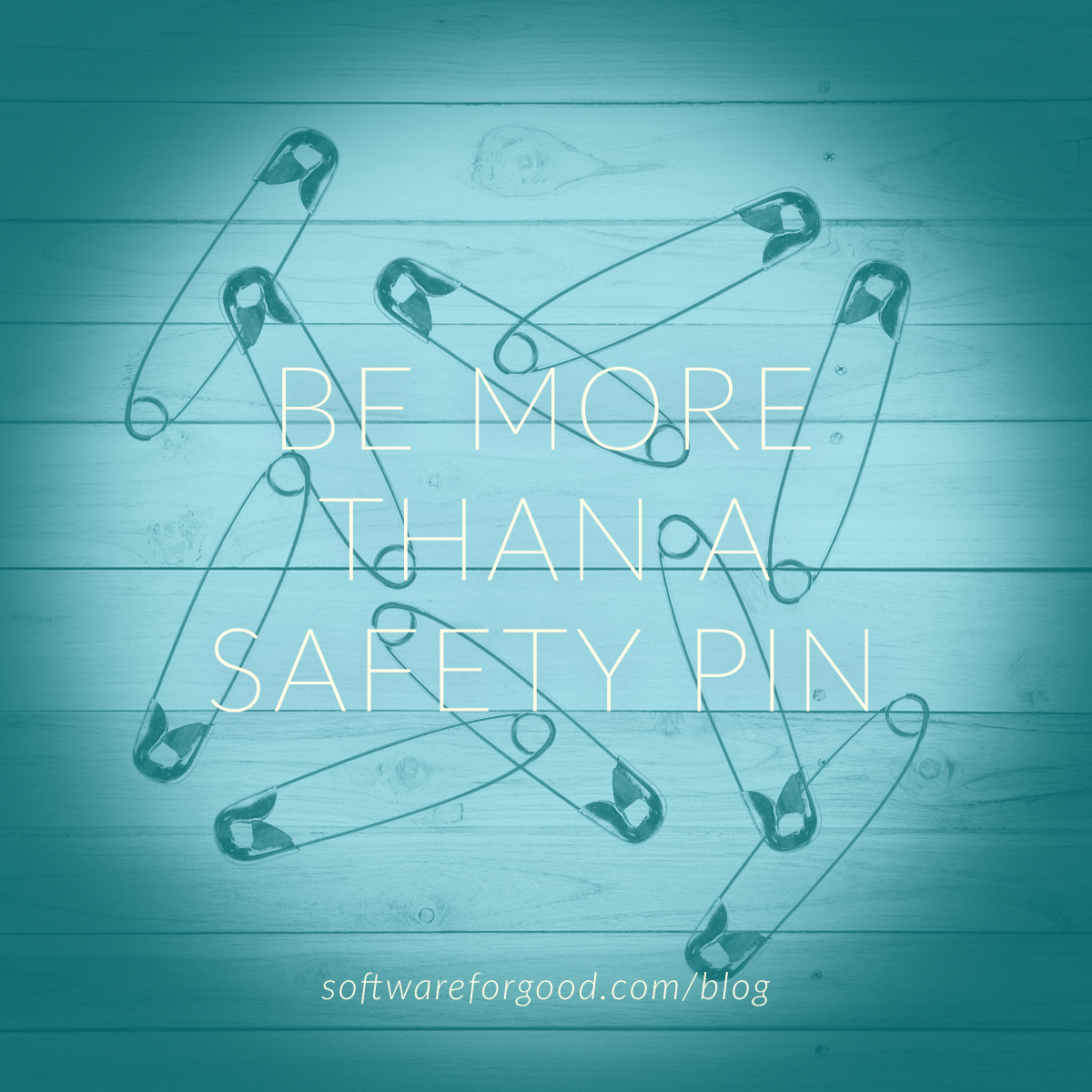In the wake of the 2016 U.S. presidential election, an outpouring of support toward marginalized individuals in this country has manifested itself in the form of wearing a safety pin on your clothes.
It’s meant to show that the individual wearing the pin is friendly and that others are safe with the wearer. As a way for individuals to self-designate themselves as allies to others, it works well. But it’s not enough. As allies, we need to do more than serve as the equivalent of a magnetic cause ribbon on the back of a car.
Peggy McIntosh wrote an essay in 1988 called “White Privilege: Unpacking the Invisible Knapsack.” In it, she identified a number of factors that contribute to the daily effects of her own privilege, including “I can criticize our government and talk about how much I fear its policies and behavior without being seen as a cultural outsider,” and “I can worry about racism without being seen as self-interested or self-seeking.” We’ve written about privilege on our blog before, and now, more than ever, it’s important to practice what we preach. It’s one thing to self-identify as an ally. It’s another step entirely to put that self-designation to the test in our everyday lives.
So how can we do it?
Donate your time and money to organizations fighting for social justice.
We’ve compiled a non-comprehensive list of causes, locally and nationally, below:
- Planned Parenthood: Give women the opportunities for proper healthcare, education, and activism.
- The Future Project: Help the young people of America fulfill their potential.
- RAINN: Assist the Rape, Abuse & Incest National Network in combatting sexual violence, aiding victims, and ensuring that perpetrators are caught.
- ACLU: Uphold the individual rights and liberties guaranteed to all by the Constitution and the laws of the United States.
- International Institute of MN: You have the power to change someone’s life. Every financial donation supports programs and services that provide a new home, education, workforce readiness, and long-term self-sufficiency for New Americans.
- Established in 1979, the National Immigration Law Center (NILC) is one of the leading organizations in the U.S. exclusively dedicated to defending and advancing the rights of low-income immigrants.
- The Center for Victims of Torture works toward a future in which torture ceases to exist and its victims have hope for a new life. They are an international nonprofit dedicated to healing survivors of torture and violent conflict, and they provide direct care for those who have been tortured, train partners around the world who can prevent and treat torture, and advocate for human rights and an end to torture.
- Green Card Voices aspires to build a bridge between immigrants, non-immigrants, and advocates from across the country by sharing the first-hand immigration stories of foreign-born Americans, by helping us see the ‘wave of immigrants’ as individuals, with interesting stories of family, hard work, and cultural diversity.
- The Southern Poverty Law Center is dedicated to fighting hate and bigotry and to seeking justice for the most vulnerable members of our society. Using litigation, education, and other forms of advocacy, the SPLC works toward the day when the ideals of equal justice and equal opportunity will be a reality.
- ARC works with its partners and constituencies to provide opportunities and expertise to refugees, displaced people and host communities. They help people survive conflict and crisis and rebuild lives of dignity, health, security and self-sufficiency. ARC is committed to the delivery of programs that ensure measurable quality and lasting impact for the people we serve.
Consider organizations fighting for diversity in tech.
As a tech company, we’re always working to improve our efforts to cultivate a more inclusive tech community. Locally and nationally, there are organizations working toward similar goals. Consider sponsoring events, donating time or money, or purchasing advertisements from organizations like:
- MAES – Latinos in Science and Engineering is the foremost Latino organization for the development of STEM leaders in the academic, executive, and technical communities.
- BDPA is an international organization with a diverse membership of professionals and students at all levels in the fields of information technology, computer science and related S.T.E.M fields. Members are actively engaged in serving the community through outreach and charting the future of the IT industry.
- The American Indian Science and Engineering Society (AISES) is a national, nonprofit organization focused on substantially increasing the representation of American Indians, Alaska Natives, Native Hawaiians, Pacific Islanders, First Nations and other indigenous peoples of North America in science, technology, engineering and math (STEM) studies and careers.
- SACNAS is an inclusive organization dedicated to fostering the success of Chicano/Hispanic and Native American scientists, from college students to professionals, in attaining advanced degrees, careers, and positions of leadership in STEM.
- Blacks In Technology is a professional platform for PoC in technology. BIT serves to increase the visibility and participation of PoC in tech through community, media, mentorship, and stewardship.
- Trans*H4ck shifts the ways trans*, gender non conforming, agender and non binary people live by creating technology that economically empowers, improves access to social services, promotes gender safety and community sustainability, while bringing visibility to trans* tech innovators and entrepreneurs.
- Black Girls Code hopes to provide young and pre-teen girls of color opportunities to learn in-demand skills in technology and computer programming at a time when they are naturally thinking about what they want to be when they grow up.
- Code 2040 is a nonprofit organization that creates pathways to educational, professional, and entrepreneurial success in technology for underrepresented minorities with a specific focus on Blacks and Latino/as.
- Hidden Genius Project trains and mentors black male youth in technology creation, entrepreneurship, and leadership skills to transform their lives and communities.
Actively intervene every time you see racism, sexism and misogyny.
Don’t just be a bystander! Don’t make a victim seek you out for support—actively engage in providing a safe space for those at risk! Paris-based illustrator Maeril recently created a comic outlining strategies allies can take to help bystanders witnessing Islamophobic harassment, for example:

Seek out voices from marginalized communities.
Make a conscious decision to integrate a wider variety of voices in your media consumption. Do you follow many LGBTQ individuals on Twitter? Are you actively seeking out voices different than yours to augment what you already know with something that might challenge you? I regularly read content by voices like Roxane Gay, Bell Hooks, Ta-Nehisi Coates, Shaun King, Raquel Cepeda, Rebecca Cohen, Xeni Jardin and am always looking for ways to diversify my media diet further. Reach out to me with your suggestions, I’d love to hear them!
Sign the MN Tech Diversity Pledge
Our friends over at Clockwork created a pledge for other tech organizations to sign, with the goals of committing resources, energy and time toward increasing the representation of LGBTQ, POC and women in the tech community. Take a minute and sign for your organization.
It’s a lot more than a safety pin, I know.
It may seem overwhelming, but as a person of privilege, I know it’s the bare minimum I can do to elevate those who need it most. How about you? If you want to talk about any of this, shoot me an email. Let’s dialogue together. Let’s work together. This week, and every week.

